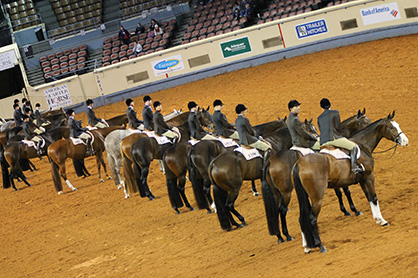Congress Passes a Number of Bills That Will Affect Horse Industry
 (Washington, DC)- The 114th Congress, though it started with the partisan gridlock that has become the new normal in Washington, ended the year with a burst of productivity by passing several major pieces of legislation including a tax extender bill, an omnibus appropriations bill, and a five year highway bill. Each of these bills includes provisions favorable to the overall horse industry that have been priorities for the American Horse Council.
(Washington, DC)- The 114th Congress, though it started with the partisan gridlock that has become the new normal in Washington, ended the year with a burst of productivity by passing several major pieces of legislation including a tax extender bill, an omnibus appropriations bill, and a five year highway bill. Each of these bills includes provisions favorable to the overall horse industry that have been priorities for the American Horse Council.
In addition, other bills championed by the AHC have seen Congressional action and could be passed with enough industry support in the second session of this Congress which adjourns in December.
“The AHC works on a diverse set of issues that impact the horse industry, often over the course of several years. For this reason it’s not every day that we see several AHC priorities pass Congress in the span of a month,” said AHC president Jay Hickey. “These three bills included tax provisions, guest worker reforms, and trail programs that will benefit the racing, showing, and recreational segments of the industry.”
The Tax Extender bill, called the Protecting Americans from Tax Hikes Act of 2015, reinstates three-year-depreciation for all race horses for two more years. It also increases the Section 179 business expense deduction back to $500,000 and makes this provision permanent. The bill restores bonus depreciation for qualifying new property, including assets used in the horse business, such as horses and other equipment, purchased and placed in service during 2015 through 2019. The bill also restores and makes permanent favorable tax treatment for land donated for conservation purposes, particularly land donated by farmers and ranchers, like horse owners and breeders.
“These provisions benefit racing and everyone who is in the horse business. Importantly, horse businesses, breeders, and farms can now make long term plans to take advantage of these tax provisions instead of just hoping Congress will extend them for one year, as has been the case recently,” continued Hickey.
The omnibus appropriations bill that will fund the government until September 30, 2016, also includes important H-2B temporary worker changes. The bill rolls back parts of a burdensome new H-2B rule and will make it easier for horse industry employers to use the program when no American workers can be found.
“Horse industry employers, mainly horse trainers and owners who cannot find American workers to fill semi-skilled jobs at racetracks and horse shows, often have to turn to this program for workers. They do this because they have no choice and this program has gotten progressively more expensive and harder to use. Most H-2B workers in the industry are directly responsible for the care of the horses upon which the entire horse industry is dependent and without them thousands of American horse industry jobs could be lost,” said AHC vice president of government affairs Ben Pendergrass.
“We have been working on fixing the shortcomings of the H-2B program for years, both through the regulatory process, standalone legislation, and the appropriations process with a coalition of other users of the program. There is still work that needs to be done, but this bill will improve the program,” said Pendergrass.
The AHC says the end- of- the- year legislative sprint to the finish line also saw reauthorization of two programs important to recreational riders, the Federal Highway Administration’s Recreational Trails Program (RTP) and the Land and Water Conservation Fund (LWCF).
The multi-year national highway bill recently signed by the president known as the Fixing America’s Surface Transportation Act, or the FAST Act, reauthorizes RTP for the next five years and provides $85 million annually for the program. RTP provides funding directly to the states for recreational trails and trail-related facilities for all recreational trail users and has greatly benefited equestrians.
The omnibus appropriations bill reauthorizes the Land and Water Conservation Fund (LWCF) for three years with funding of $450 million for FY 2016. The program, which expired on October 1, 2015, provides funds and matching grants to federal, state and local governments for the acquisition of land and water for recreation and the protection of natural resources and helps provide equestrians with increased recreational trail riding opportunities.
“We are very pleased RTP was included in the FAST Act. Every time a multi-year national highway bill is debated there is always an attempt to eliminate this program and this time was no different,” said Pendergrass. “The AHC has advocated for the RTP program since its inception and grassroots support from recreational trail users, including many equestrians, played an important role in making sure RTP was included in bill.”
“This has been a productive legislative session for the AHC and horse industry. In addition to these important legislative victories the AHC also advanced several other important bills. The Prevent All Soring Tactics Act (PAST Act) (S.1121/ H.R.3268) that would end the soring of Tennessee Walking Horses was re-introduced and currently has 232 co-sponsors in the House and 48 in the Senate. Additionally, the National Forest System Trails Stewardship Act (H.R. 845/S.1110) that would help improve trails on National Forests has been gaining momentum and has been called ‘the most bi-partisan bill in Congress,’” said Hickey. “We will be working on these bills and other issues that impact the entire horse industry in 2016.”










